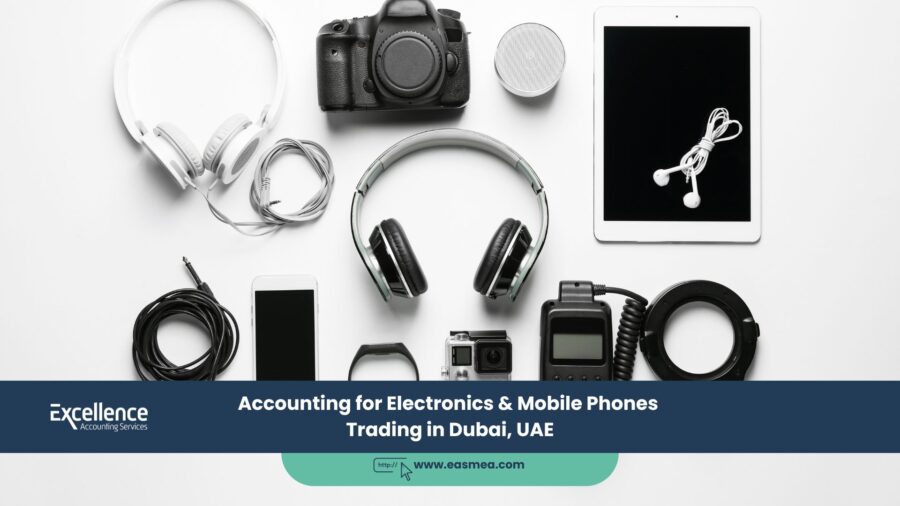Dubai’s position as a global trade and logistics hub makes it a powerhouse in the electronics and mobile phones trading sector. From the bustling wholesale markets of Deira to the vast e-commerce landscape, traders in Dubai supply the latest technology to the entire MENA region and beyond. While the market is characterized by high demand and rapid innovation, it is also an industry of intense competition, rapid product depreciation, and complex supply chains. For traders, profitability is a direct result of sharp, agile, and highly accurate financial management.
Accounting for an electronics and mobile phones trading business in Dubai is a unique challenge. It requires managing an inventory whose value can plummet with the announcement of a new model, accounting for warranties and returns, and reconciling sales from multiple online and offline channels. Without a robust accounting framework to navigate these complexities, even a business with high sales volume can find its margins erased by obsolete stock and unforeseen costs.
This definitive guide provides a strategic blueprint for Accounting for Electronics & Mobile Phones Trading in Dubai, UAE. We will explore the critical financial practices for the tech trading sector, from the crucial management of inventory obsolescence to the complexities of e-commerce platform reconciliation. We will also provide clarity on the application of VAT and the new UAE Corporate Tax to your operations, ensuring your business is compliant and financially sound.
Whether you are a wholesaler, a retailer, or an e-commerce specialist, this guide will equip you with the financial knowledge to build a resilient and profitable enterprise. We will cover industry best practices, essential financial controls, and the reporting that builds confidence with suppliers, distributors, and financial institutions in this fast-paced market.
Key Takeaways
- Inventory Obsolescence is the Biggest Risk: The core challenge is managing inventory that rapidly loses value. Accounting for and minimizing the risk of obsolete stock is critical to protecting profits.
- Warranty Provision is a Key Liability: You must account for the future cost of warranty claims by creating a “warranty provision” on your balance sheet when products are sold.
- E-commerce Reconciliation is Complex: Selling on platforms like Amazon and Noon requires meticulous reconciliation of sales, platform fees, returns, and payouts to determine true profitability.
- Gross Margin is Everything: In a competitive, price-sensitive market, accurately calculating your landed cost and tracking your gross profit margin on every product line is essential for survival.
- VAT and Corporate Tax Compliance: Electronics are subject to 5% VAT, and your profits are subject to 9% Corporate Tax. Compliant accounting is a legal and financial necessity.
The Financial Anatomy of an Electronics Trader
An electronics trading business operates in a fast-moving consumer goods (FMCG) environment, but with high-value items. The business model is driven by sourcing products efficiently, managing inventory turnover with extreme discipline, and competing on price and availability. Success depends on lean operations, strong supply chain management, and a deep understanding of the product lifecycle.
Operating in the UAE means adhering to regulations from the Telecommunications and Digital Government Regulatory Authority (TDRA) for type approval of devices, as well as standards from authorities like the Emirates Authority for Standardization and Metrology (ESMA). Compliance with these standards is a necessary part of your operational framework.
Core Principles of Accounting for Electronics & Mobile Phones Trading in Dubai, UAE
The fundamental principle of accounting for electronics & mobile phones trading in Dubai, UAE, is the rigorous management of fast-depreciating inventory. Unlike other industries, your primary asset loses value at a dramatic rate. Your accounting system must be able to track not just the cost of your inventory, but also its age and market value, providing the data needed to make critical pricing and stock-clearing decisions.
The Inventory Obsolescence Challenge
This is the single greatest financial risk for an electronics trader. The moment a new model of a smartphone or laptop is announced, the value of the previous model in your warehouse drops significantly. Holding onto old stock is not just tying up cash; it’s actively losing money. Your accounting and inventory management must be geared towards mitigating this risk.
The First-In, First-Out (FIFO) method of inventory costing is essential. Operationally, you must sell your oldest stock first. Your accounting system must reflect this by costing your sales based on the price of the oldest units in stock. Furthermore, at the end of each accounting period, you must perform a “net realizable value” (NRV) test. This means comparing the cost of your inventory to its current market selling price. If the market price is lower than what you paid for it, you must “write down” the value of the inventory, recognizing a loss on your income statement. A professional bookkeeping service is crucial for managing this process correctly.
A Closer Look at Accounting for Electronics & Mobile Phones Trading in Dubai, UAE
Profitability in this sector is a game of pennies fought on a global scale. Accurately calculating your costs and managing future liabilities like warranties are non-negotiable for success.
Accounting for Warranties and Returns
When you sell an electronic product, you are also selling a promise to repair or replace it if it is faulty within a certain period. This warranty represents a future cost and a present liability. Under the accrual basis of accounting, you must account for this liability at the time of sale. Based on historical data (e.g., what percentage of a certain product model is typically returned), you should estimate the future cost of warranty claims and record this as an expense and a “Warranty Provision” liability on your balance sheet.
In electronics, a sale isn’t final until the warranty period expires. Accounting for that future risk today is the mark of a professional operation.
When a customer returns a product under warranty, the cost of the repair or replacement is then offset against this provision. This method correctly matches the cost of warranties with the sales revenue they relate to, preventing a sudden, unexpected expense from hitting your books in the future.
| Financial Challenge | Operational Response | Accounting Action |
|---|---|---|
| Inventory Obsolescence | Aggressive sales, bundling, and promotions to clear old stock before new models launch. | Regularly perform Net Realizable Value (NRV) tests and record inventory write-downs. |
| Warranty Claims | Efficient returns and repairs process. Tracking failure rates by product. | Create a “Warranty Provision” liability on the balance sheet based on historical claim rates. |
| E-commerce Returns | Clear return policy. Inspection process for returned goods. | Process refunds, inspect returned stock, and re-add to inventory if resalable or write off if damaged. |
The Challenge of E-commerce Platform Reconciliation
Selling through major e-commerce platforms like Amazon.ae and Noon.com is essential for reaching a wide audience in the UAE. However, the financial administration behind these platforms is incredibly complex. They provide a payout statement that is a net figure after deducting numerous fees, making it difficult to understand the true profitability of your online sales without meticulous reconciliation.
Your accounting team must break down each payout from these platforms. You need to reconcile the gross sales amount with the various deductions, which can include platform commissions, fulfillment fees (like FBA – Fulfilled by Amazon), advertising costs, return processing fees, and storage fees. Each of these fees is a separate business expense that needs to be recorded correctly in your accounting system. Simply recording the net payout as “sales” will lead to a completely inaccurate picture of your business performance.
Navigating Tax and Compliance
A professional electronics trading company in Dubai must be fully compliant with the UAE’s tax regulations. For the most authoritative guidance, you should always refer to the official website of the Federal Tax Authority (FTA).
VAT on Electronics
The sale of electronics and mobile phones within the UAE is subject to the standard 5% rate of VAT. You must issue tax-compliant invoices and collect this tax from your customers. When importing goods, you will also pay 5% VAT at customs, which you can then reclaim as input VAT. If you re-export goods to a customer outside the UAE, this is a zero-rated supply, provided you retain all official export documentation. A meticulous system for VAT accounting is crucial.
Corporate Tax for Electronics Traders
Your trading company will be subject to the 9% UAE Corporate Tax on its annual taxable profits exceeding AED 375,000. Your taxable profit is your gross profit minus your operating expenses. The accuracy of your inventory valuation, including any write-downs for obsolete stock, will have a major impact on your taxable profit. Maintaining complete records for every transaction is mandatory. Professional corporate tax services are vital for ensuring compliance.
What Excellence Accounting Services Can Offer
At Excellence Accounting Services (EAS), we have deep expertise in the retail and trading sectors. We understand the unique financial pressures of the electronics industry, from managing fast-depreciating inventory to the complexities of multi-channel sales. We offer specialized accounting services to provide the financial control and insight you need to succeed.
Our specialized offerings for electronics traders include:
- Advanced Inventory Accounting: We help you implement systems to track inventory value, manage obsolescence, and perform NRV testing.
- E-commerce Reconciliation: We specialize in reconciling payouts from platforms like Amazon and Noon, ensuring all fees are correctly accounted for and profitability is accurately measured.
- Warranty Provision and Returns Accounting: We can help you establish and manage a compliant accounting process for warranty provisions and customer returns.
- VAT and Corporate Tax Compliance: Our tax experts will manage all your FTA filings, ensuring you are fully compliant with the rules for the retail and trading sector.
- Virtual CFO Services: Get high-level strategic guidance on margin analysis, cash flow management, and inventory planning. For more details, see our Virtual CFO services.
By partnering with EAS, you gain a financial team that understands the fast-paced nature of your industry. We handle the financial complexity so you can focus on the business of trading.
Frequently Asked Questions (FAQs)
Operationally, you need to act fast. This may involve running promotions, creating bundles with accessories, or selling the stock at a reduced price to wholesalers to clear it as quickly as possible. From an accounting perspective, you must perform a Net Realizable Value (NRV) test. Compare the cost of your old stock with its new, lower market selling price. You must “write down” the inventory to this lower value, recognizing the loss on your income statement in the current period. This ensures your assets are not overstated.
You should record the full sale amount as your revenue. The commission charged by the platform is a business expense. For example, if you sell a phone for AED 1,000 and the platform deducts a 15% fee (AED 150), you should record AED 1,000 as “Sales Revenue” and AED 150 as “Platform Fees” or “Cost of Sales.” Simply recording the net payout of AED 850 as revenue is incorrect and understates the true scale of your business.
FIFO stands for First-In, First-Out. It’s an inventory costing method that assumes the first units you purchase are the first ones you sell. This is crucial for electronics because of obsolescence. You always want to sell your oldest stock first to avoid getting stuck with outdated models. Your accounting system should reflect this by assigning the cost of your oldest inventory to your Cost of Goods Sold when you make a sale.
This involves a few steps. When the customer returns the phone, you process the return. If you give them a new phone, you record the cost of that new phone as a “Warranty Expense” (which is offset against your warranty provision). When your supplier gives you a credit for the faulty unit, this reduces your “Cost of Goods Sold” or your “Inventory Purchases.” It’s essentially a refund from your supplier, which increases your gross profit.
Customs duties are not treated as a separate expense. They are a direct cost of acquiring your inventory. The amount of customs duty you pay should be added to the purchase price of the phones to calculate their total “landed cost.” This total cost is what is recorded in your “Inventory” asset account. The cost is then expensed as part of the “Cost of Goods Sold” only when the phone is sold.
If you sell on credit to corporate clients or other retailers, you face the risk that some may not pay. A provision for doubtful debts is an accounting estimate of the amount of your accounts receivable that you expect will not be collected. You record this as an expense. This is important for ensuring your assets (accounts receivable) are not overstated on your balance sheet. In a cash-based retail business, this is less of an issue, but it’s critical for wholesale operations.
Yes. If you charge a customer a fee for delivery within the UAE, that fee is considered part of the overall taxable supply. Therefore, you must charge 5% VAT on the delivery fee, just as you do on the product itself.
Gross Margin (or Gross Profit) is your Sales Revenue minus the direct Cost of Goods Sold (the landed cost of the items you sold). It shows the core profitability of your trading activity. Net Profit is what’s left after you subtract all your other operating expenses (like salaries, rent, marketing, and utilities) from your Gross Profit. Monitoring your gross margin is crucial because if it’s too low, you’ll never make a net profit, no matter how much you sell.
Operating in a free zone is excellent for import/re-export as you can store goods without paying customs duty. For Corporate Tax, you may be eligible for a 0% rate on “Qualifying Income,” which typically includes income from trade with businesses outside the UAE or in other free zones. However, sales to mainland UAE customers from a free zone are generally subject to the 9% tax rate. Your accounting must be able to clearly segregate these different types of sales. Maintaining audited financial statements is also a mandatory condition for receiving free zone tax benefits.
The most common mistake is failing to manage inventory effectively. This includes not having a system to identify and clear out old stock quickly, leading to massive losses from obsolescence. It also includes not accurately calculating the full landed cost of products, which leads to under-pricing and poor gross margins. In a market where product values fall so quickly, inventory management is not just an operational task—it’s the primary financial management task.
Conclusion: Engineering a Profitable Tech Trading Business
The electronics and mobile phones trading market in Dubai is a thrilling, fast-paced environment that rewards agility, market knowledge, and efficiency. The financial success of any trading enterprise in this sector is built not on chance, but on a foundation of rigorous accounting and financial control. A system that can navigate the complexities of high-value, fast-depreciating inventory is the key to survival and growth.
By mastering the challenges of inventory obsolescence, warranty accounting, and multi-channel reconciliation, and by maintaining unwavering compliance with the UAE’s tax and regulatory landscape, you build a business that is both resilient and profitable. This financial clarity empowers you to make smart buying decisions, price your products with confidence, and manage your risks effectively. In the world of technology trading, sound accounting is the operating system that runs a successful business.
From Inventory to Income.
Let Excellence Accounting Services provide the specialized financial management and industry insight your business needs to succeed in the UAE's competitive market.




